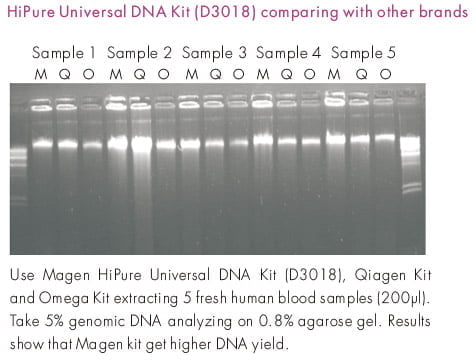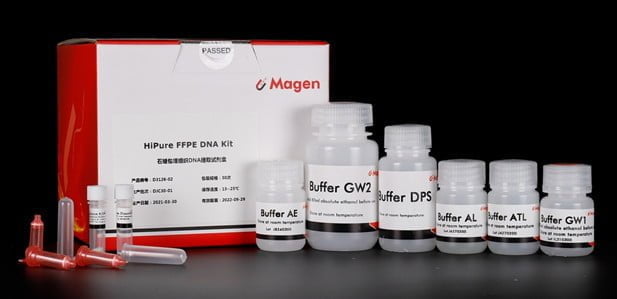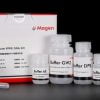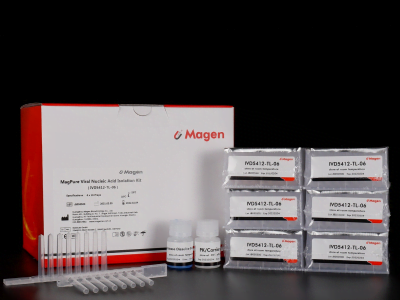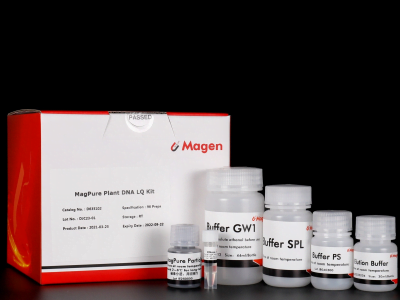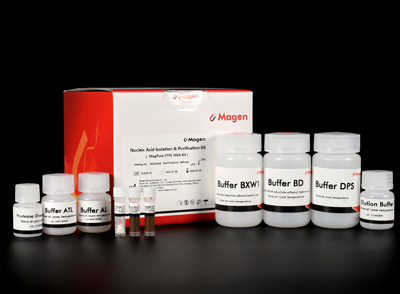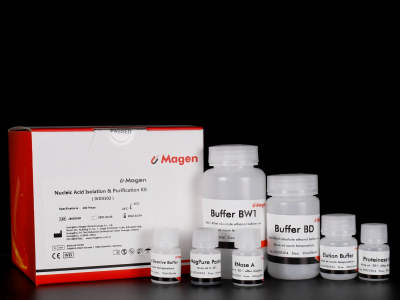This product offers a convenient and rapid method to purify total DNA from a wide range of samples, making it ideal for various downstream analyses:
- Fast and Efficient: The protocol is streamlined for quick DNA extraction with minimal hands-on time.
- High-Quality DNA: The system isolates total DNA (genomic, viral, mitochondrial) with high purity, suitable for reliable PCR, quantitative PCR (qPCR), Southern blotting, and viral DNA detection.
- Broad Sample Compatibility: The method effectively purifies DNA from a variety of sources, including:
- Tissue
- Cells
- Blood
- Saliva
- Swabs
- Blood Spots
- Semen
- Other clinical samples
- Downstream Applications: The purified DNA can be used directly in various research techniques, including:
- PCR (Polymerase Chain Reaction)
- qPCR (quantitative PCR)
- Southern Blotting
- Viral DNA Detection
- Other DNA-based analyses
This solution simplifies DNA extraction while maintaining high quality, making it a valuable tool for researchers working in various fields of molecular biology, forensics, and diagnostics.
Specifications
| Features | Specifications |
| Main Functions | Isolation of total DNA from tissue/blood/body fluid/swab/dry blood spots |
| Applications | PCR, qPCR, southern bolt and virus detection, etc |
| Purification method | Mini spin column |
| Purification technology | Silica technology |
| Process method | Manual (centrifugation or vacuum) |
| Sample type | Tissue, cells, blood, saliva, swabs, blood spots, semen, and other clinical samples |
| Sample amount | Solid tissue: 1-10mg; Anticoagulant blood: 200μl |
| Elution volume | ≥20μl |
| Time per run | 30 – 60 minutes |
| Liquid carrying volume per column | 800µl |
| Binding yield of column | 100µg |
Principle
- Purification Method: Utilizes silica column purification for efficient nucleic acid extraction.
- Sample Lysis and Digestion: Samples are lysed and digested using lysate and protease, facilitating the release of DNA into the lysate.
- Nucleic Acid Adsorption: The lysed sample is transferred to an adsorption column, where nucleic acids selectively adsorb onto the membrane.
- Protein Removal: Proteins, which do not adsorb to the membrane, are removed through filtration, ensuring purity of the extracted nucleic acid.
- Washing Step: Proteins and other impurities are washed away from the membrane to enhance the purity of the extracted nucleic acid.
- Elution: Nucleic acid is finally eluted from the membrane using a low-salt buffer (10mm Tris, pH 9.0, 0.5mm EDTA), resulting in efficient recovery of high-quality nucleic acid.
Advantages
- High-quality DNA – meets a variety of downstream applications, including PCR, qPCR, enzyme digestion, hybridization, etc.
- Fast – without separation of leukocytes, organic extraction, or ethanol precipitation
- Simple – all nucleic acids can be obtained by direct digestion
- Wide applicability- handle a variety of liquid samples
Kit Contents
| Contents | D301802 | D301803 |
| Purification Times | 50 | 250 |
| HiPure DNA Mini Columns I | 50 | 250 |
| 2ml Collection Tubes | 100 | 500 |
| Buffer ATL | 30 ml | 150 ml |
| Buffer AL | 30 ml | 150 ml |
| Buffer GW1 | 22 ml | 88 ml |
| Buffer GW2 | 12 ml | 50 ml |
| Proteinase K | 24 mg | 120 mg |
| Protease Dissolve Buffer | 1.8 ml | 10 ml |
| Buffer AE | 15 ml | 60 ml |
Storage and Stability
- Proteinase K Storage: Upon arrival, store Proteinase K at 2-8°C. Short-term storage (up to 12 weeks) at room temperature (15-25°C) is acceptable without affecting performance.
- Remaining Kit Components Storage: The remaining kit components can be stored at room temperature (15-25°C) and remain stable for at least 18 months under these conditions.
- Whole Kit Storage: The entire kit can also be stored at 2-8°C. However, in this case, buffers should be redissolved before use. Ensure all buffers are at room temperature when used for optimal performance.
Experiment Data
